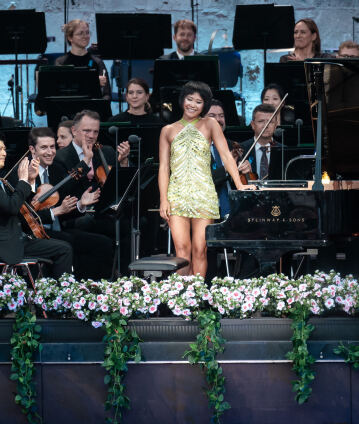Season finale at the Waldbühne with Kirill Petrenko and Yuja Wang

Maurice Ravel’s ecstatic Boléro under Berlin’s night sky – the Berliner Philharmoniker and Kirill Petrenko could not find a more atmospheric way to end the season in the Waldbühne. Beforehand, star pianist Yuja Wang plays the solo part in Prokoviev’s First Piano Concerto – a work in which she dazzlingly displays her creativity. Ravel’s Suite No. 2 from Daphnis et Chloé transports listeners to a pastoral idyll from ancient mythology.
For 40 years now, the Berliner Philharmoniker have concluded their season in the open air at the Waldbühne – for the first time, Yuja Wang will be joining them here. The pianist made her stunning debut in 2015 with Sergei Prokofiev’s extremely virtuosic Piano Concerto No. 2, and will now perform the composer’s First Piano Concerto at the side of chief conductor Kirill Petrenko.
“What a wealth of new and unprecedented harmonies in his concerto, how distinctive, rich and original the melodies, how vibrant the rhythms everywhere, and above all – how it pulsates with life, how the sun of unbridled imagination sparkles,” was one critic’s verdict on Sergei Prokofiev’s First Piano Concerto after its premiere in Moscow in 1912. The 22-year-old Prokofiev himself was the soloist. This youthful work, unusually short for its genre, is characterised by its impressive sonority and originality. Inspired by the majestic, yearning themes of the piano concertos of Liszt and Rachmaninov, Prokofiev broke with the Romantic form and confidently developed it further. The concerto’s capricious rhythms and its numerous moments of surprise, which Prokofiev places directly alongside lyrical episodes, caused some contemporaries to raise an eyebrow. But the up-and-coming composer was about to lay the foundations for his international career – thanks to his pianistic virtuosity and the development of his very own style.
Maurice Ravel’s music for Daphnis et Chloé is in no way inferior to Prokofiev’s pulsating youthful work. The Second Suite presents a best-of ballet music: from the opening sunrise to the ecstasy of the dizzying final dance, Ravel creates the images of the ballet in bright colours with the very finest of shading. Finally, the Boléro is a perfectly calculated and meticulously orchestrated explosion of sound: coming from nowhere, the music dances trance-like to the beat of the snare drum, swelling steadily and progressing relentlessly towards its thrilling release at the end.
© 2024 EuroArts Music International
Related interview
Category
Artists
Our recommendations
- Andris Nelsons conducts Tchaikovsky at the Waldbühne
- Gustavo Dudamel conducts Tchaikovsky and Brahms at the Waldbühne
- Yannick Nézet-Séguin conducts a “Czech Evening” at the Waldbühne
- Simon Rattle and Magdalena Kožená at the Waldbühne
- Simon Rattle conducts Rhapsodies at the Waldbühne
- Simon Rattle conducts “Russian rhythms” at the Waldbühne